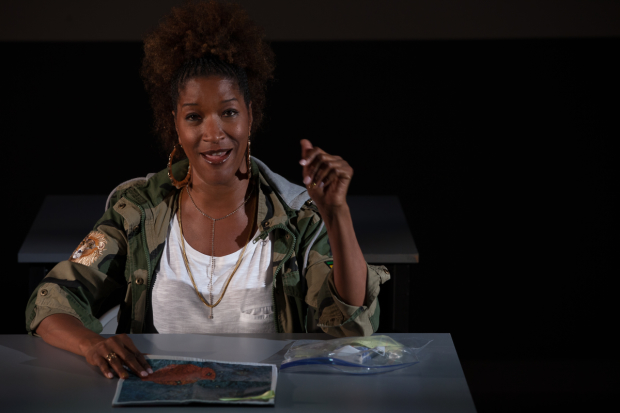The Peculiar Patriot
Liza Jessie Peterson indicts the prison industrial complex in her solo play at the National Black Theatre.

(© Christine Jean Chambers)
During the first half of the 19th century, the word "slavery" was deemed unfit for polite conversation and replaced with a more decorous phrase, "our peculiar institution." History eventually changed that peculiar adjective to "monstrous," but perhaps if we had not perfumed the air around slavery for so long, we would have ceased to fertilize the earth beneath it far sooner. We'll never know how true that speculation is, but Liza Jessie Peterson is testing the theory with The Peculiar Patriot, her self-penned solo show at the National Black Theatre, in which she boldly labels the prison industrial complex as "slavery remixed."
Considering that the word "slavery" was too taboo for the era in which it was a legal institution, to call anything the modern-day equivalent is a bold accusation — and one that Peterson and her director Talvin Wilks stanchly substantiate in every word of their presentation. Peterson plays a woman named Betsy LaQuanda Ross — a former juvenile delinquent whose adult life is spent either at work or visiting African-American friends and family in prison. Despite the somber events, which always start with a somewhat dehumanizing pat-down before she's allowed entrance (illustrated in Katherine Freer's ominous projections and the familiar sound of prison doors opening and closing designed by Luqman Brown), Betsy keeps her chats unfailingly upbeat.
Lively anecdotes (including one about slapping a woman at Barnes & Noble over the use of a pay phone) and droll updates on her tumultuous love life (a tug-of-war between a new and old lover, both of whom have substantial rap sheets) are the most common topics of these one-sided conversations. In between, she weaves in heavier news about other folks in her circle, most of whom have been in and out of prison their whole lives for various drug convictions.
Peterson is a wonderful storyteller who could make the phone book sound warm, funny, and engaging. Her delivery smooths over some of the rougher edges of her play, which vacillates between personal or second-hand stories and didactic monologues about the injustices of the system in which she lives. One moment, we hear about a black mother who was given jail time for using her babysitter's address to sneak her child into a white school district. The next, Peterson will slip into the skin of her politically minded boyfriend Pablo as he explains the ins and outs of prison gerrymandering.
When the majority of your mission is to convey information, there are few routes around the occasional lecture — and all of the information Peterson communicates is valuable to have in a world where it's often suppressed. Theatrically speaking, however, The Peculiar Patriot is aching for a stronger throughline to drive home the emotional impact of the statistics and faceless stories Peterson puts forward as proof of a racially biased incarceration system.
The one thread that tenuously weaves together each of the scenes is a quilt Betsy sews over the course of her many prison visits — a skill she learned from the beloved teacher who gave her the nickname "Betsy" (as in, Betsy Ross) during her unruliest childhood days. It's one of the play's most heartwarming stories, and aptly frames Betsy as the "peculiar patriot" into which her environment has molded her. Rather than a Daughter of the American Revolution, she's a daughter of a Black Panther. Instead of volunteering at soup kitchens, she spends her free time driving from prison to prison keeping her community afloat the only way she can. And instead of boastfully waving red, white, and blue, she flies her hand-woven flag with patches that honor the men and women deemed dishonorable by both society and a dishonest legal system. The Peculiar Patriot is certainly not perfect, but we should all be grateful to see her face in the light of day .







